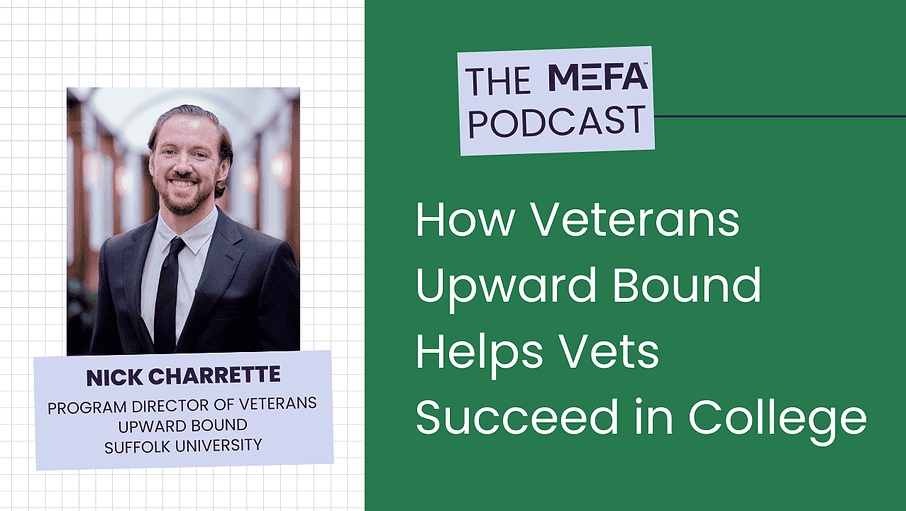

Resources Mentioned in this Episode
Jonathan Hughes: [00:00:00] Welcome to the MEFA Podcast everyone. My name is Jonathan Hughes.
Julie Shields-Rutyna: And I’m Julie Shields-Rutyna.
Jonathan Hughes: And as always, we have a great show for you today. We’re welcoming back to the show. Suffolk University’s Director of Veterans Upward Bound, Nick Charrette, we had a wide ranging conversation and it’s always nice to have him on and it’s sort of timely in a way, it being the end of May and close to Memorial Day to have somebody, from the military on, but also this being the end of May, we’re close to 529 day, which is something that we like to celebrate all the time. And we have done, you know, 529 day shows in, years past about the U Fund. But this year we’re going to do something a little bit different, right Julie?
Julie Shields-Rutyna: We are, yeah, we wanted, definitely wanted to highlight 529 Day, but as you’ve [00:01:00] said you know, We’ve done 529 shows and we have another 529 Plan, 529A. What are we going to talk about, you know, with our ABLE plan? And so this show is part of that answer. So here on the show, first time on the podcast is MFA’s Community Outreach Manager for the Attainable® Program, Adam Hartwell. So Adam, welcome to the MEFA Podcast.
Adam Hartwell: Thank you so much. Happy to be here.
Julie Shields-Rutyna: So I guess just to start, can you tell us a little about your professional background and how you came to be here at MEFA working on the Attainable® Program.
Adam Hartwell: It’d be my pleasure. I spent about the last 20 years or so in direct service, I had the pleasure of working in the school system in direct support in the community.
I did autism community skills instruction. I ran a day debilitation classroom. I ran residential programs. And I spent 12 years working in employment services, including winning a national award. [00:02:00] So my entire history has been generally working in a position of advocacy and assistance across the spectrum.
And as such, I was a firsthand witness to the challenges that exist with finances for individual disabilities, particularly those who are receiving benefits. And so when ABLE was announced in 2014, I got extremely excited when ABLE became administered in 2017. I started waving the flag and I had the great pleasure shortly thereafter of meeting MEFA’s own, Mary Rubenis, who was in my role at the time.
And we built a relationship of trying to make sure that we were having people be educated about able over the years. And it is now my pleasure to be in that role myself.
Jonathan Hughes: Wow, that’s so great. Yeah. And you know, speaking of ABLE programs, I wonder if you could just take people through the basics of the ABLE program.
Adam Hartwell: Right. ABLE is an interesting program. It is section 529A of the tax code, which [00:03:00] was signed in in 2014. ABLE is the Stephen Beck Jr. Achieving a Better Life Experience Act. Each state got to select how they were going to administer it and give it its own name. So here in Massachusetts we call it Attainable®.
The point of ABLE is they are investment accounts that do not get taxed on their growth and provide an opportunity as funds that are put into an ABLE account are not counted as assets against the SSI limit. In general, SSI has about a $2,000 limit for how many assets you can have, and there’s a different limit that reflects that in how much income you can earn per year.
And what this does, because that number hasn’t been adjusted since the early eighties. Is in order to try to keep up with that lower number, people are in a a realm of enforced poverty. They cannot save money for medical appointments. They cannot save money for transportation. They cannot save money for first last security.
They can’t essentially save money for anything, what that would allow them. [00:04:00] To progress in their independence and able, it provides a tool to assist in that process.
Julie Shields-Rutyna: And, you know, from your prior experience and your experience since you’ve been at MEFA what do you see as the most pressing needs that we can help address with Attainable® and all of our outreach?
Adam: Because ABLE is such a useful tool across a wide variety of, areas. There are a lot of different zones in which I think that they’re pressing need. One of the big ones being there is a motivation, a feeling that able only applies to people with developmental disability, but able actually applies to anyone who has anything that meets the functional limitations categories.
Under the Social Security Administration, so that means long-term cancer recovery, that means significant mental health challenges. That means CPTSD, that mean, you know, particularly for veterans because ABLE does work alongside VA benefits very well. So there are all these people who could be utilizing this program, this, this tool that might [00:05:00] be able to help them that are not currently aware of it.
Additionally, because I don’t want to downplay the fact that there are a significant number of people with developmental disabilities who could also benefit from this program. It provides an opportunity for independence. It provides an opportunity to save funds to be able to save for a car so you can get a better job, you can use, able to pay for education so that you can raise yourself up in that way you can use, able to cover your bills so that you’ll be able to not be so worried about trying to work against the edge.
And it also means that we have a, thing in disability services called spend downs, where when someone is scared of losing their benefits because they have too many assets, they spend money on something they don’t need. ABLE provides a way to not have to do that anymore.
Jonathan Hughes: I was wondering if you could talk about, you know, some of the ways that, that we can reach people that we haven’t done yet,
Adam Hartwell: You know, MEFA has been doing a fantastic job of trying to get the information out there, and we will continue to work [00:06:00] on that. In fact as, as a team, as a process. We are attending every transition resource fair that we can possibly attend. We go to community gatherings and we set up tables at large scale.
Town events and what have you. We also have a very strong social media presence and we write blogs, we, we create webinars and we create publicly available webinars, and we’re also starting to set up some regular monthly conversations to allow people to interact with us. We also have a very strong relationship that is only growing over time with stakeholders and agencies and state services throughout the, throughout the state in order to try and build that knowledge and also to try and overcome the fear that tends to exist when people are talking about something that might impact their finances. So we are, you know, trying to make sure that that information is as widely available as possible, and that will be a continuous effort for us.
Julie Shields-Rutyna: Can you talk about some of the developments in the program, any of the changes at the national level [00:07:00] in terms of policy or anything else that’s going to make a difference in people’s lives?
Adam Hartwell: Well, absolutely. One of the wonderful things about the ABLE Act and the program is that it has only made forward progress over the, you know, the, the years of its existence. It’s still a fairly new program, so frankly able itself just coming into the world is a wonderful step forward. But additionally, just looking at like the past year, if we look at you know starting in like November, we were able to add rep payees which is a Social Security administration designation.
It used to mean that you were a person who can controlled social security income and what that could be used for rep payees are now allowed to open able accounts on behalf of the people they serve. As of January 1, the numbers for how much you can deposit into an Attainable® account went up again.
So now it is $17,000 per year if you’re not working with an additional $13,590 if you are working. Last year it was 16,000. It was a thousand dollars less. We [00:08:00] also passed just a couple months ago the ABLE Age Adjustment Act under the current guidelines for ABLE, a person is eligible to set up one of these accounts if they.
Have some sort of documentation that can state that they received their diagnosis before the age of 26. So you can be 50 now, and if your doctor says, you know, you’ve definitely had this since birth, you are eligible for an Attainable® account. But if you’ve got a traumatic brain injury at 30, you wouldn’t be eligible for an Attainable® account right now.
However, as of January 1st of 2026, that age of eligibility will go up to age 46. This program keeps on increasing in both those who are eligible to utilize it and also what can be done with it. It’s extremely exciting that we have official confirmation that you can use. ABLE alongside housing subsidies you can use, able to pay for assistive technology.
You can use, ABLE to pay for transportation, which means you can use, and that doesn’t just mean a car. That also means public transportation services. [00:09:00] That means Uber, you know, anything that gets you from here to there, you can use it to pay for college if you want to raise yourself up in that way. Or a trade school or any other type of education or training.
And also you can use it to pay for one-on-one services. And we have, again, there’s a thought when I say one-on-one services, that we think in skill instruction, somebody walking around with you and helping you out in your day-to-day life. But in this case, it also means your attorney, your accountant, anyone who is providing you the ability to have better understanding and control of your life able is a truly, truly wonderful program as far as its ability to assist people in moving forward.
Jonathan Hughes: That’s fantastic. All great news. And, and to bring it back to 529 Day, can you talk about some of the ways in which traditional 529 plans overlap with ABLE plans?
Adam Hartwell: ABLE was kind of built on the, on the skeleton that is 529. That’s why that’s 529 as we know, is the funds that go into a 529 account are used for qualified educational [00:10:00] expenses.
The money that goes into a 529A or Attainable® or ABLE account can be used for qualified disability expenses. They reflect each other in the ways that a lot of times the way the taxes are worked on them. They say they’re both tax advantaged accounts. For instance, if you put money into it, because these are investment accounts, if you put it into a 529A the growth on the account from the investment will not be taxed as income as long as, that money is being utilized for those qualified disability account expenses, which is a very, very broad definition. Additionally, 529 and 529A can interact with each other, in some really beautiful ways, including if you already had a 529 account set up, you can roll that money into a 529A without fees. I don’t, I’ve decided, I don’t, I don’t think college is going to be for me, but I do think that I’m going to want to be able to use this money for other things.
So you can roll the money from a 529 into a 529A.
Jonathan Hughes: It’s very exciting to see the [00:11:00] ABLE Program grow, as you said, in all the ways in which it has done and the expansion. And it’s very exciting to have you here to talk about it on the podcast and hopefully you’ll be back soon to do it. Now it is time for the MEFA Mail bag and these are questions that have come into us over the past weeks and have been answered by our College Planning team.
So remember, if you have any questions, you can email us at [email protected]. You can call us at 800-449-MEFA, or when you can also reach us over social media on Facebook that’s @MEFAMA, on Twitter, @MEFATweets, and on Instagram MEFA_MA. So today’s question comes to us from a customer who writes, how does financial aid come into play when applying early decision? Can you decline acceptance from a school that you apply to early decision if you get more aid from another school? So Julie, nice meaty question for you to answer today.
Julie Shields-Rutyna: It is that one has, [00:12:00] has a number of layers. So I’m going to step back for, I guess I’ll quickly answer it and say no. But now I’ll step back and explain.
So what early decision is, so early decision is a very specific admissions process. Where it’s not just like early action where you have an earlier deadline and you apply earlier and you find out your decision earlier. It’s different. It’s really a binding agreement if you are applying to a college early decision.
Essentially what you’re saying to that college is, if you admit me, I will come. And so to do that, a number of things I would say should be in place for you, the student and your family. And one of those is that you really want to make sure that far and away, this is your top choice. You want to go there much more than any of your other choices.
Because essentially not only are you saying, yes, I will [00:13:00] attend, you’re also saying, If you admit me, I will withdraw all of my other applications, and so that means you will never know where else you are admitted and you will not. Receive any financial aid offers from any of those other places either, you’re not going to know that.
So you need to make this decision knowing that you could be forgoing a higher financial aid offer from another institution. And sometimes I will say to families, you have to go into that decision. Knowing another college could give you $20,000 more. I mean, we see situations like that, but, but that can’t matter to you.
You have to know that this is where I want to go and it’s affordable for our family. So how can, you know how it’s, if it’s affordable for your family?
Jonathan Hughes: Going to be my question. Yeah. Yeah.
Julie Shields-Rutyna: Well, all colleges have something called a net price calculator on their, websites. I would say absolutely use that net price [00:14:00] calculator. And in fact, although it will just be an estimate that you’ll receive of the type of financial aid that you could receive. Colleges that have early decision programs want that net price calculator to match pretty closely to the methodology that they are going to use. So it should be a fairly good estimate of what you’ll receive as a family for a financial aid offer, and if that offer seems reasonable and affordable to you as a family.
Then I think you can go into that early decision application, feeling good about it. You could also talk to the institution if you have special circumstances and you just want to talk it through more. You want to do whatever you can upfront to do your homework. So that you put a good faith effort into feeling like it’s affordable for you.
So for that reason if you are in that early decision process and you are admitted, you will never see any other offers from another school to be able to [00:15:00] compare and therefore decline.
Jonathan Hughes: All right. Well, thank you, Julie. Now remember folks, if you have any questions, you can email us. Our email address is [email protected].
Our phone number is 800-449-MEFA and our Facebook is MEFAMA, Twitter @MEFATweets and Instagram, once again, MEFA_MA. We have a bench of college guidance experts waiting to answer your question. Now let’s go to my conversation with the program director for Veterans Upward Bound at Suffolk University, Nick Charrette.
Nicholas Charrette is an Army veteran with five years of service, and he’s the program director of the Veterans Upward Bound Program at Suffolk University. Welcome back to the show Nick.
Nick Charrette: Thank you so much. I’m happy to be here.
Jonathan Hughes: In regular language. What would you say that Veterans Upward Bound does?
Nick Charrette: Sure. [00:16:00] I would say that, you know, we make sure whatever it is that you as the veteran need to be successful in post-secondary education. Whether it’s academic assistance prior to enrolling or understanding your benefits we offer that to you as the veteran completely free of charge. We wanna make sure that when you enroll in post-secondary education you have a high chance of success.
Jonathan Hughes: Yeah, tell me what has the past year been like?
Nick Charrette: Yeah, so over the past year I think it’s been a, a year of growth for Veterans Upward Bound as a whole. We were able to finally start offering some things in person again, which was nice because while being remote is nice because we are able to we were able to reach a lot of different veterans in different parts of the state who otherwise wouldn’t have participated because they couldn’t make it to downtown Boston.
It is also nice to have that in-person option for veterans who truly want to be in a classroom and have that, you know, personalized one-on-one interaction. Additionally, we’ve, you know, got some new and improved programming as well. This past month actually, we finally implemented our tutoring program, which we were really excited to be able to. [00:17:00] Offer that to veterans and additionally adding new courses like computer literacy and whatnot. You know, I think this past year we’ve been able to just continue to better serve our veterans by adding new programs and refining existing ones.
Jonathan Hughes: Yeah. You mentioned the tutoring program, and that’s something I, I want to ask you about. Can you tell us about that?
Nick Charrette: Sure. So the tutoring program, it’s actually something that you know of. Any Veterans Upward Bound program around the country is authorized. To implement as it’s allowable under our Department of Education grant. But it was just something that, you know, when I got hired, we weren’t doing, and then, you know, as I’ve you know, we’ve started to make sure that we’re always, you know, implementing our, you know, our federal guidelines and our grant the right way that we looked at, and we’re like, this is something that, you know, we should definitely try and try and implement.
The way that it works is just if a veteran’s interested, we can administer a pre-test assessment using some software called tape, which stands for Test of Adult Basic Education. And then from there, you know, review the results with our team and the veteran. And then we’ve got this [00:18:00] great partnership with our host University, Suffolk University, where they allow us to send veterans in our program to Suffolk, CLAS, which is the Center for Learning and Academic Success.
And what’s great is that this is, you know, completely free of charge to veterans. Whether the veteran ends up wanting to go to Suffolk or maybe a different school like Bunker Hill Community College, if they’re working with us, they have access to tutors at Suffolk University.
Jonathan Hughes: And so is this done before a veteran starts to take classes or, or during classes, or when can they take advantage of this?
Nick Charrette: The, so all the services that we offer are available to veterans prior to enrolling. So the idea being, you know, veterans could have access to tutoring at Suffolk prior to enrolling, and then when they’ve enrolled at the university or institution of their choice, they would have access to tutoring at that institution where they’re, they’ve enrolled. All of the services that we offer are pre-college. So we do, you know, stay in touch with and check it up on our veterans who [00:19:00] we end up helping enroll at various colleges and universities. However, you know, as far as our services go it’s restricted to prior to a veteran enrolling.
Jonathan Hughes: And so I’m curious about how a program like this. Get started. Is this something that you hear from veterans themselves or is it just you know, where does this come from?
Nick Charrette: So it was something that, you know, when I first got hired in reviewing our grant, I looked at it and saw it was there, but it was something that felt like a kind of a monster of a task to tackle, especially with, you know, the backdrop of COVID and whatnot.
But as I’ve started to. You know speak to other veterans who went through the program almost a decade ago when UMass Boston had the Veterans Upward Bound grant. They mentioned tutoring. So it was something that, you know, I kept hearing from veterans and I decided to look back into it. And we also started to realize that there are definitely some veterans who, you know, would benefit from tutoring more than our traditional refresher courses that usually run 10 weeks.
The reason for that is, you know, if we have a veteran who’s been out, you [00:20:00] know, been out of education for 10, 15, 20 years, it’s likely that they would benefit more from like a 10-week refresher course where we truly start, like for math, we’d start with arithmetic and walk them up through pre-algebra.
However, if we have, you know, maybe, you know, a veteran who’s did one contract in the military they get out of the military at, you know, 23, 24, they may be a little bit more fresh academically. And with them it makes more sense to be able to administer the pretest to them, see if they have any academic deficiencies that you know, that need to be addressed.
And then instead of enrolling them in a 10-week course, be able to really target what their need is. So if a veteran takes our math pretest and they generally do well but maybe, you know you know, maybe they’re not doing too hot in geometry and they need that refresher. It allows us to just pinpoint that exact subject material and hook them up with the tutor so that they don’t have to do the whole 10 week course if they’re not going to benefit from the all the material.
Jonathan Hughes: I see. I see. And so how do, how do they take advantage of this? Is this something that, [00:21:00] you know, they, they come to Upper Bound in the first place and then there’s an assessment, or how does that work?
Nick Charrette: That’s generally how it works, as long as the veteran is eligible for Veterans Upward Bound. So as long as they, they don’t have a bachelor’s degree yet they don’t have a, well, they have anything other than a dishonorable discharge and they’re not currently enrolled in school, then they’re going to be eligible for Veterans Upward Bound.
And from there it’s just, you know, veteran can reach out, we’ll fill out a quick application have a little admissions meeting, administer pretest, and then get them, you know, hooked up with some Suffolk University tutors.
Jonathan Hughes: That’s great. Now I, sort of, we, we spoke the last time a year ago. And, and some of this, you know, we had a, a conversation.
Not all of it got on the actual show, but we were speaking about. Your actual educational path, and we’ve begun to highlight on this sort of various pathways that, that people have taken to go to college. And so one of the ways that we wanted to highlight as a pretty popular one is the military. And so [00:22:00] I was wondering if you could talk about your college experience you know, being a service member.
Nick Charrette: Sure. So my college experience actually started four years before I joined the military. Out of high school. I kind of, you know, dabbled with the idea of joining the military. And when I talked to my parents about it, they kind of shut it down pretty quick and they weren’t very excited about that.
So I ended up enrolling at Newberry College, which is a now defunct school in Brookline, and then transferring to UMass Boston as well. And, you know, I, did pretty well. Like I was a good student. But for me, I kind of felt lost. I didn’t really, I kept changing my major. I didn’t know what I wanted to study or even do long term.
So for me, I kind of looked at the military as a good opportunity to, you know, pause, so to say my education and my career ambition so I could figure out exactly what I wanted to do and then have the added benefit of, you know, funding the rest of my education. So I ended up joining the military, which again, my parents were not too excited about that.
But in the end, you know, it served me incredibly well because [00:23:00] I, I believe I was a pretty good student prior to the military. But post-military, I, you know, I think I’m an e I’ve been an even better student. I was, you know, able to make my education, my full-time job just because of the benefits that were afforded to me based on my service.
And, yeah, I think that wraps up my college experience pretty well.
Jonathan Hughes: So I remember, but what, so the financing of your education, you know, was, was that a part of the reason that you, you joined the military, it sounds like you wanted to join the military before that though.
Nick Charrette: Yeah, so I think for me so like, like I said, when I talked to my parents about it and they kind of shut it down, I didn’t really have a grasp on what financing or education meant.
Student loans was just, that’s what you did. And I didn’t really understand it too much. Having gone to school for a few years at that point and then realizing, you know, some of the burdens of my student loans and especially not knowing if I was going to have a suitable career that’s going to help me pay them off on the other side.
Because I, again, I just didn’t know exactly what I wanted to do. I think that the financing of, you know, your [00:24:00] education as a veteran was kind of the deciding factor for me. Knowing that when you’re on active duty, the tuition assistance that you get is great. I finished my bachelor’s degree while on active duty, which was awesome.
Wow. And then knowing when I got out I’d have the GI Bill or I’d be eligible for the GI Bill and also other programs like Chapter 31, veterans Readiness and Employment. You know, I did my research on these Veterans education benefits prior, and it was pretty clear that there’s nothing. You know, offered in the civilian world, whether it’s scholarships or not, that really matches it just because you get all of your tuition paid.
You get a monthly housing allowance that is based on the zip code of where your school is. So in a place like Boston, it’s, you know, pretty expensive place to live. So the housing stipend goes a long way and making sure that, you know, you’re just comfortable, you and your family are comfortable in your, in your home life, so you can truly just focus on your education.
Jonathan Hughes: Yeah. And this, these are things that we talked about the last time you were on the show when we talked about GI Bill benefits and, and things like that. So if anybody’s [00:25:00] curious, you should go back and listen to your first appearance on the show. I’m curious if you could, how was it, what was it like completing your degree on active duty?
Nick Charrette: Well, it was tough because, I mean, the military is. A difficult life. Like there are great benefits, but the reason that the benefits are so nice is because it is, there is a lot of trade off. But it was something that, you know, in my final two years I had a little bit, I don’t want to say cushy is not the word, but it was a little bit less of a demanding job while I was waiting to get out.
So I decided to take advantage of tuition assistance and, you know, it was still tough, you know, doing classes at night after working, you know, five, 12 hour shifts a week. But it was something that I wanted to finish. And I wanted to get out with a bachelor’s degree so that, you know, should, you know, my you know, I, knew I was going to go to school as well, but, you know, I’d also like to get out with that bachelor’s degree to make myself more marketable.
But it, it was difficult to finish. But I think you know, I had some perspective on, I. How difficult life can be while you’re in the military. So looking at something like finishing a [00:26:00] bachelor’s degree it wasn’t, it, it put it in perspective. It made it a little bit easier to just, you know, push through and make sure I finish it.
Jonathan Hughes: And, and if I can ask, why do you feel that you were a better student after the military?
Nick Charrette: I think that there’s a lot of things, you know, that the military instills in you and whether or not you realize it’s happening, it’s, it’s something that, you know, they just do build into you with things like discipline. And, you know, time management. I know that there’s different variations of the saying, but a lot of my leaders always used to say to me in different words, but essentially, you know, if you’re, if you’re 15 minutes early, you’re late. So I was always, I’ve always been really good, at least since the military, about making sure that, you know, I’m meeting deadlines.
And also just having the discipline to get things done. Like obviously there’s always going to be times where, you know, you feel like you don’t have time to study for an exam or you don’t want to write that paper because you want to go see family and friends. But the military did for me was truly just like I, I made sure that my education was my number one mission and there was nothing that could [00:27:00] get in the way of it because it was my duty and I was going to get it done.
Jonathan Hughes: When you actually did end up joining the military. Did, was the fact that they were paying, you know, they would pay for your education did that help you with your parents?
Nick Charrette: I think it did. I think, you know, when I re-approached them the second time, it was like, you’re really going to do this again.
But when I kind of talk to them with more of a long term plan, like, look what I can do, I can. I can get this military experience that’s going to, you know, give me some great skills like teamwork and leadership. And, but also, you know, long term, I know in the next four to five years while I’m completing my contract, I’m going to know what I want to do.
I’m going to know where I want to go to school, and it’s all going to be paid for. And I think for them, they kind of looked at it more as like, all right, like you’re going to leverage it to the, you know to your benefit and get a lot out of it.
Jonathan Hughes: So if you were You know, talking to somebody else who was thinking about taking this path, what would you recommend to them?
Nick Charrette: Yeah, it’s, it’s, [00:28:00] this is a conversation that I, I feel like I have occasionally in, you know, my personal life. Cuz obviously I work mostly with veterans who’ve already completed their service. But I think sometimes when I, people find out, you know, I work in Veterans education, They hear about the benefits and like, wow, that sounds nice.
And they are incredible benefits, but the life isn’t for everyone. It’s not an easy life. And like I said prior, the benefits are incredible, but they are great and they’re, you know, they’re the best benefits in the country because the military is hard. There is a tradeoff there. What I would say to anyone thinking about joining you know, whether the education’s a factor or not.
Is if you can use the time in your contract to plan your exit. So if you’re planning on just doing one contract and then going to school using your GI bill plan ahead. Because if you know, if you can do that, you can really set yourself up for success. Know which school you want to go. Like, you know, know a few schools that you might want to go to.
Start to think about careers degrees, what have you. And, and learn a little bit about your GI bill or Voke rehab or whatever [00:29:00] benefit that you think you may be using beforehand. Because it, again, it’s just going to set you up for success and you’ll avoid a lot of pitfalls that unfortunately some veterans might find themselves in when they separate from the military.
And additionally, I would just say, I kind of alluded to it earlier as well, but take a lot out of your military experience, even if, you know, you end up in a job that you didn’t really like, kind of how I felt. It was a job I thought I would like and ended up not enjoying. There’s still a lot of things to take out of it.
You’ll really learn to be a team player, which is valuable wherever you go. And then same thing with leadership. There’s so many opportunities in the military that, you know, you can be thrust into leadership three to four years in when, you know a job in the civilian world may take you, you know, way longer than that to be put in that position.
So take advantage of all those soft skills that you can you know, put on your resume and you know, leverage to the to your benefit. And I think, you know, If you could do all that, you know, plan to get out whenever you think you’re getting out, really plan your exit and take advantage of everything the military has to offer.
It’ll afford you a nice exit that sets you and your family up for [00:30:00] success you know, in the civilian world.
Jonathan Hughes: Yeah, that’s great. If folks wanted to get in touch with, with you, or if veterans are bound, how do they do that?
Nick Charrette: So they can either you know, shoot me an email directly. I can put, if you want, I don’t know if you want me to put my email in the in the chat or they can reach us at 617-725-4139.
Additionally, we have a website, VB for Veterans Upward Bound, vbma.com and whatever works best for the veterans. Some veterans I know want to be in person, so feel free to just drop by at 73 Tremont Street in downtown Boston. On at Suffolk University’s main building. If you’d rather do things over the phone, that’s fine.
We can do things on Zoom, whatever works best for the veteran. We want to just, you know, make sure that, you know, we really tailor the program to the veterans so that they’re taking advantage of everything that we have to offer.
Jonathan Hughes: Well, that if you’re 15 minutes early, you’re late. Now. I know we, while you were the first person on the Zoom to meet us, but it was great to talk to you again, Nick.
Thank you so much. Absolutely.
Nick Charrette: Thank you so much for having me. [00:31:00]
Jonathan Hughes: All right folks, so that about wraps it up for us. I want to thank Nick Charrette for sharing his time with us. I want to thank Adam Hartwell for being here with us. Adam, thank you.
Adam Hartwell: My true and honest pleasure, sir.
Jonathan Hughes: And folks, have you liked what you heard today and you want to know more about planning, saving, and paying for college and career readiness?
You can follow the show on Apple Podcast, Spotify, Stitcher, wherever you get your shows. And please to remember, please remember to review us. It helps us to keep doing what we are doing and to get this show out in front of people like you. Julie, thanks so much.
Julie Shields-Rutyna: Always fun. Thank you.
And I also want to thank Shaun Connolly, our producer, and I want to thank AJ Yee for his assistance in posting the show as well as Lauren Danz. Once again, my name is Jonathan Hughes and this has been The MEFA Podcast. Thanks. [00:32:00]











